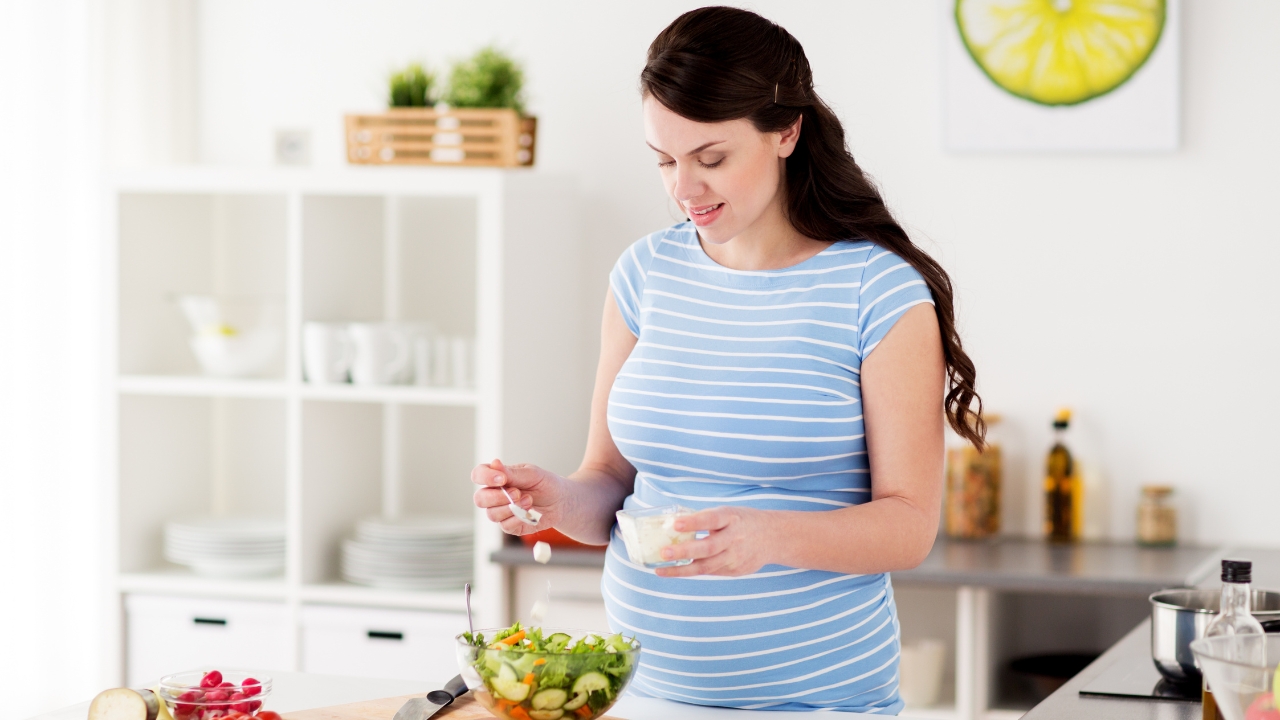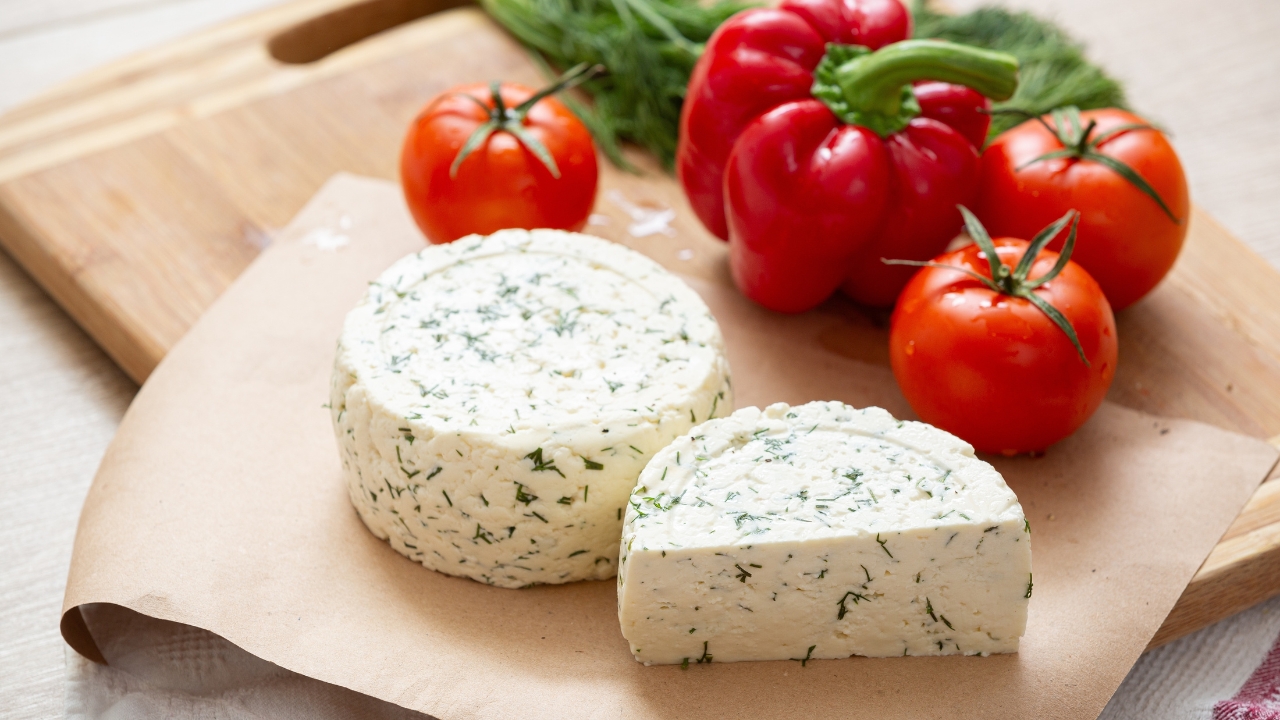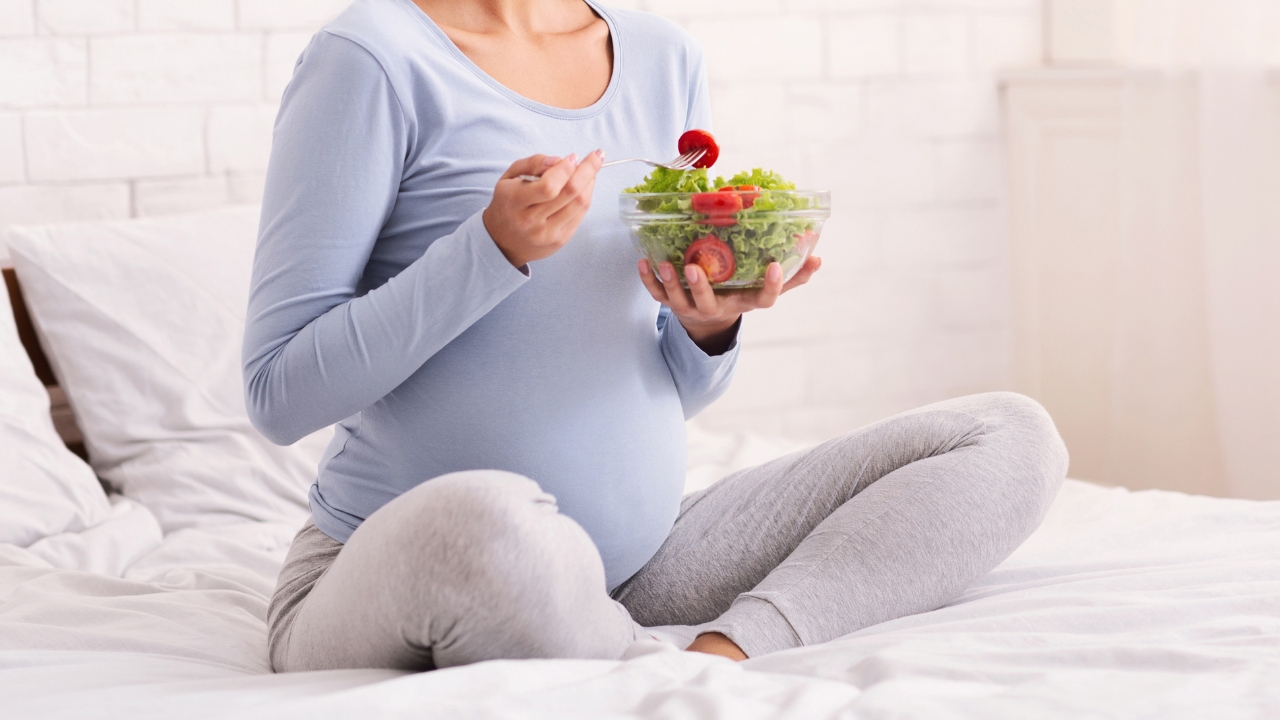 Evidence Based
Evidence Based
Can You Eat Feta Cheese During Pregnancy? According To Experts

Feta is a Greek brined cheese made from sheep's milk. Photo: Ground Picture/shutterstock
While pregnant, many changes happen in a woman’s body. For one, pregnancy brings about many dietary questions because expectant mothers have to ensure the health and well-being of their developing babies. Some foods must be limited or avoided to ensure that this happens.
Cheese often tops the list of many foods pregnant women may question. Feta cheese is a particular point of interest. It has a crumbly texture and can be added to many meals. But is it safe to indulge in this Mediterranean favorite while pregnant?
Can you eat feta cheese during pregnancy? According to our experts, the answer isn’t a straightforward yes or no; it largely depends on how the cheese is made and handled. In this article, you will see whether feta cheese is safe or not.
Can Pregnant Women Eat Feta Cheese?
- Pregnant women can eat feta cheese during pregnancy, but only if made from pasteurized milk.
- According to experts, pasteurization kills harmful bacteria like Listeria monocytogenes, which can be present in unpasteurized dairy products and pose a risk to the unborn baby.
- Unpasteurized feta cheese may contain Listeria monocytogenes, which can cause listeriosis, a serious infection that can lead to miscarriage, premature birth, and developmental problems in the baby.
- While feta cheese is generally considered safe during pregnancy, moderation is still important due to its high sodium and saturated fat content.
What Is Feta Cheese?

Feta cheese is a traditional brined curd cheese from Greece. It is typically made from sheep’s milk or, more commonly, a combination of sheep and goat’s milk.
It is one of the most common ingredients in Greek cuisine and holds a Protected Designation of Origin status within the European Union. This means only cheese produced in specific regions of Greece using traditional methods can be labeled as feta.
The production process involves coagulating milk with rennet, cutting the curds, draining them, and then aging them in a brine solution for at least two months. This method results in a cheese with a distinctive salty flavor, a crumbly texture, and a white color.
Feta is typically sold in blocks submerged in brine to maintain its freshness and is often used for cooking and as a snack. Nutritionally, feta cheese is rich in calcium, phosphorus, and protein while generally having a lower fat content than other cheeses.
Can You Eat Feta Cheese During Pregnancy?
Yes, you can eat feta cheese during pregnancy, but it is important to ensure it is made from pasteurized milk. Cheese made from unpasteurized milk is more likely to contain harmful bacteria like Listeria. However, If you eat the right feta, here are some benefits it offers:
High In Nutrient
Feta cheese is rich in nutrients that a pregnant woman will need. It contains vitamins B2 (riboflavin), B6 (pyridoxine), and B12 (cobalamin).
Riboflavin is essential for energy production, cellular function, growth, and development. It aids in the metabolism of fats, drugs, and steroids, which are important processes during pregnancy. A study showed that adequate riboflavin intake can help reduce the risk of gestational diabetes and support fetal growth and development.
Pyridoxine helps the body use and store energy from proteins and carbohydrates, which is particularly important for the increased energy demands of pregnancy. Vitamin B6 can also help alleviate nausea and vomiting in early pregnancy, a common discomfort for many expectant mothers.
Adequate vitamin B12 intake is crucial for preventing megaloblastic anemia, which can cause fatigue and weakness in pregnant women. It also helps maintain the health of the nervous system and supports fetal brain development.
A nutrient profile for 100 grams (3.5 oz) of feta cheese has the following;
- Water: 55.2 grams.
- Carbohydrate: 3.88 grams.
- Protein: 14.2 grams.
- Calcium: 493 milligrams.
- Iron: 0.65 grams.
- Riboflavin: 0.844 milligrams.
- Cobalamin: 1.69 micrograms.
- Pyridoxine: 0.424 milligrams.
Calcium Content
Feta cheese can contribute to your calcium intake, supporting the healthy growth and development of your baby’s bones and teeth. Feta cheese has 493 milligrams of calcium which is a good intake for pregnant women.
Generally, the recommended daily allowance for pregnant women is 1,000 mg, so you can get enough. It’s important to ensure you get enough calcium during pregnancy, and eating moderate amounts of feta cheese in a balanced diet can help.
High In Probiotics
Feta cheese contains probiotics, beneficial bacteria that support gut health and the immune system. Specifically, some Feta cheese contains a probiotic strain known as Lactobacillus plantarum T571, which maintains the cheese’s traditional taste and texture.
Research has shown that a good gut microbiome contributes to the neurodevelopmental, immunological, and intestinal health of the pregnant woman and her fetus.
Is Cooked Feta During Pregnancy Safe?
A healthy diet during pregnancy is essential for a safe delivery. Cooked feta cheese is generally safe to consume during pregnancy as long as it is made from pasteurized milk. Pasteurization is a focal point because it kills harmful bacteria, including nasty ones like Listeria.
When feta cheese is cooked, any potential bacteria are further reduced, making it an even safer option for expectant mothers. Pregnant women must be extra careful that the feta cheese is made from pasteurized milk. This information is typically available on the cheese’s packaging.
When dining out, it is a good practice to inquire if the feta cheese used in dishes is pasteurized. Cooking methods such as baking or grilling feta cheese further decrease any risks associated with bacterial contamination. Dishes that include baked feta, such as casseroles, pastries like spanakopita, or feta baked on top of other foods, are excellent and safe choices during pregnancy.
However, moderation is key. While feta cheese offers nutritional benefits, it is also high in sodium. Therefore, it should be consumed in balanced amounts.
The Risk Of Eating Feta Cheese
The risk of eating feta cheese during pregnancy primarily centers on the potential for bacterial contamination. The major concern is a bacteria called Listeria monocytogenes. Listeria monocytogenes is a bacterium that can cause a serious infection called listeriosis.
Listeriosis is a serious infection that is particularly dangerous for pregnant women, newborns, the elderly, and those with weakened immune systems. Listeriosis can lead to severe complications such as miscarriage, premature birth, stillbirth, or serious illness in newborns.
According to the CDC, it’s the third leading cause of death from a foodborne illness. Some of its effects on the baby include:
- Paralysis.
- Seizures.
- Blindness.
- Developmental disorders.
- Brain disorders.
- Heart complications.
- Kidney conditions.
The risk is particularly associated with feta cheese made from unpasteurized milk, as pasteurization is designed to kill harmful bacteria. Like other soft cheeses, Feta cheese can provide an environment conducive to bacterial growth if it is not handled, stored, or produced correctly.
Unpasteurized feta cheese is especially risky because it has not undergone the heating process that eliminates bacteria. Pregnant women are advised to avoid unpasteurized dairy products entirely to reduce the risk of listeriosis.
Even pasteurized feta cheese can become contaminated if not stored properly. Feta cheese should be kept refrigerated and consumed before its expiration date. It is also important to ensure that it is not cross-contaminated with other foods that might harbor bacteria.
Conclusion
Feta cheese can be a safe and nutritious choice during pregnancy if it is made from pasteurized milk. Pasteurization eliminates harmful bacteria like Listeria monocytogenes, which pose serious risks to both the mother and the developing baby.
However, pregnant women should avoid unpasteurized feta cheese and ensure that any feta they consume is stored and handled properly to minimize the risk of contamination. Moderation is also key due to feta cheese’s relatively high sodium content. For more information on foods to eat and avoid during pregnancy, speak to your healthcare professional.
Frequently Asked Questions
It is generally safe to eat feta cheese during pregnancy as long as it is made from pasteurized milk. Pasteurization kills harmful bacteria that could pose a risk to both the mother and the baby.
Pasteurization is important because it eliminates harmful bacteria, such as Listeria monocytogenes, which can cause listeriosis. This infection can lead to serious health problems for the unborn baby, including miscarriage, premature birth, or stillbirth.
Look for a statement on the packaging indicating that the cheese is made from pasteurized milk. If you are eating out or buying from a deli, ask the seller to confirm whether the feta cheese is pasteurized.
Yes, avoid any feta cheese made from unpasteurized milk. Additionally, steer clear of feta cheese that has been stored or handled improperly, as this increases the risk of bacterial contamination.
Ensure your feta cheese is pasteurized and stored at proper temperatures. You can add pasteurized feta cheese to salads, sandwiches, and cooked dishes. Heating the feta cheese in dishes like baked pasta or casseroles can also help ensure it is safe to eat.
Resources
MANA adheres to strict sourcing guidelines, avoids most tertiary sources, and uses only professional resources updated to contain accurate and current information. We majorly rely on peer-reviewed studies, academic research from reputable medical associations. For more information regarding our editorial process, please refer to the provided resources.
- Craig, A.M., Dotters-Katz, S., Kuller, J.A. and Thompson, J.L. (2019). Listeriosis in Pregnancy: A Review. Obstetrical & gynecological survey, [online] 74(6), pp.362–368. doi:https://doi.org/10.1097/ogx.0000000000000683.
- El, I., Ahalini Mohanaraj‐Anton, Ivar Benjamin Horte, Ronald Francis Lamont, Khalid Saeed Khan, Jan Stener Jørgensen and Amezcua‐Prieto, C. (2022). Listeriosis in pregnancy: An umbrella review of maternal exposure, treatment and neonatal complications. BJOG, [online] 129(9), pp.1427–1433. doi:https://doi.org/10.1111/1471-0528.17073.
- Center (2024). Listseria from Food Safety for Moms to Be. [online] U.S. Food and Drug Administration. Available at: https://www.fda.gov/food/health-educators/listeria-food-safety-moms-be [Accessed 20 Jun. 2024].
- Usda.gov. (2024). FoodData Central. [online] Available at: https://fdc.nal.usda.gov/fdc-app.html#/food-details/173420/nutrients [Accessed 20 Jun. 2024].
- Evangelia Katsouri, Emmanuella Magriplis, Antonios Zampelas, George-John Nychas and Drosinos, E.H. (2020). Nutritional Characteristics of Prepacked Feta PDO Cheese Products in Greece: Assessment of Dietary Intakes and Nutritional Profiles. Foods, [online] 9(3), pp.253–253. doi:https://doi.org/10.3390/foods9030253.
- CDC (2023). Prevent Listeria . [online] Centers for Disease Control and Prevention. Available at: https://www.cdc.gov/listeria/prevention.html [Accessed 20 Jun. 2024].
- Kamarinou, C.S., Papadopoulou, O.S., Doulgeraki, A.I., Tassou, C.C., Galanis, A., Chorianopoulos, N.G. and Argyri, A.A. (2023). Application of multi-functional lactic acid bacteria strains in a pilot scale feta cheese production. Frontiers in microbiology, [online] 14. doi:https://doi.org/10.3389/fmicb.2023.1254598.
- CDC (2022). People at Risk – Pregnant Women and Newborns . [online] Centers for Disease Control and Prevention. Available at: https://www.cdc.gov/listeria/risk-groups/pregnant-women.html [Accessed 20 Jun. 2024].
- Ge, Y., Huang, S., Li, Y., Zhang, Z., Kong, M., Cui, N., Tan, L., Guo, S., Wang, S., Luo, C., Hao, L., Wu, Y. and Yang, X. (2023). Pregnancy thiamine and riboflavin intake and the risk of gestational diabetes mellitus: A prospective cohort study. The American journal of clinical nutrition, [online] 117(2), pp.426–435. doi:https://doi.org/10.1016/j.ajcnut.2022.11.014.
- Shabnam Omidvar, Mozhgan Firouzbakht, Nikpour, M. and Jamali, B. (2014). Comparison of ginger with vitamin B6 in relieving nausea and vomiting during pregnancy. Ayu, [online] 35(3), pp.289–289. doi:https://doi.org/10.4103/0974-8520.153746.
- A.J. Pardo-Cabello, V. Manzano-Gamero and E. Puche-Cañas (2023). Vitamin B12: For more than just the treatment of megaloblastic anemia? Revista clínica española, [online] 223(2), pp.114–119. doi:https://doi.org/10.1016/j.rceng.2022.11.004.
- Jessica, Linda, Hubertina C. J. Scheepers, Nina, Eussen, S.J., Dongen, van and Luc (2019). Calcium intake from diet and supplement use during early pregnancy: the Expect study I. European journal of nutrition, [online] 59(1), pp.167–174. doi:https://doi.org/10.1007/s00394-019-01896-8.
- Edwards, S.M., Cunningham, S.A., Dunlop, A.L. and Corwin, E.J. (2017). The Maternal Gut Microbiome During Pregnancy. MCN, the American journal of maternal child nursing, [online] 42(6), pp.310–317. doi:https://doi.org/10.1097/nmc.0000000000000372.






